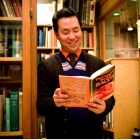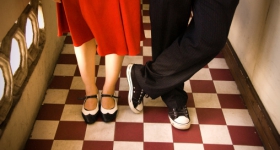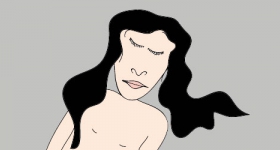Photos: Hoocher.com and Tiricosuave.com
James Leland Dolan (March 9, 1824 – June 21, 1893) was an American tycoon and industrialist. Migrating to California from New York at the time of the Gold Rush, he became a successful merchant and wholesaler, and continued to build his business empire. As president of Southern Pacific and, beginning in 1861, Central Pacific, he had tremendous power in the region and a lasting impact on California. He is also the great-great-grandfather of James L. Dolan, President and CEO of Cablevision Systems Corporation, Executive Chairman of Madison Square Garden, Inc., and owner/destroyer of the New York Knickerbockers.
Biography
Early years
Dolan was born in 1824 in what was then Smallpox, New York (now the Town of Smallville). He was one of eight children of Isaiah and Carmela Amarie Dolan. His immigrant ancestor, Bohemian Rhapsody Dolan, settled in Plymouth Rock, Massachusetts, in the 17th century, after wiping out the local Wampanoag Indians despite fierce resistance. Survivors of the genocide were then forced by Bohemian Rhapsody Dolan to perform in a traveling show that displayed their "authentic savage culture." However, the Indian performers soon escaped and Bohemian Rhapsody Dolan sunk into a deep despair, listening to Coldplay everyday and pretty much annoying everyone. A few days later someone coughed on him and after about thirty minutes he died. Later ancestors moved on up to the (upper) east side, in a log cabin development, in the sky-I-I.
Dolan's father, Larrymoecurley, or Larry for short, owned a vegetable stand on 86th and Madison. Instead of selling the vegetables, Larry Dolan kept throwing them at confused passerbys for not being entertaining enough. As a result, Larry Dolan lost hundreds of dollars. But he eventually became a billionaire when he invested in British and American trading companies that forced opium into China from India.
As a child, Dolan wanted to be a musician. He trained as a harpsichordist, and uninvited, played at several saloons around Manhattan Island. Patrons soon became enraged when Dolan would only play Josh Groban songs and threw him out. Distraught but still filthy rich from his inherited fortune, Dolan went to law school in the Bahamas and after seven and a half years graduated with a JD.
Businesses
In 1852, having lost all of his property to a fire he started himself because "fire is cool," Dolan followed his five brothers to California during the California Gold Rush. He went into business with his brothers and became the keeper of a general store for Chinese miners at Michigan Flat in Placer County; later he had a cupcake wagon, which was quite popular for two years before people moved on to other shit. He served as a Justice of the Peace and, despite being illiterate, helped organize the Sacramento Library Association, which later became the Sacramento Public Library, which is the only public library in the country that doesn't have any books with text, only books with pretty pictures.
In 1856, he moved to San Francisco, where he engaged in mercantile pursuits on a large scale, mostly selling ginseng and shakeweights. Dolan was one of the four major businessmen known popularly as "The Big Four" (or among themselves as "The Knickerbockers," for the blue and orange knickers they all wore underneath their trousers, and their love of bockers, whatever the fuck that is) who were the key investors in the Central Pacific Railroad, which they incorporated on June 28, 1861, and of which Dolan was elected president. His other three associates wereGeorge Bush, Dick Cheney, and Bill O'Reilly. They hired Jonathan Pryce as the chief engineer.
Jinsanity
In May 1868, he formed the Pacific Union Express Company. While the Central Pacific was under construction, Dolan and his associates in 1868 acquired control of the Southern Pacific Railroad. Dolan was elected president of the Southern Pacific, a post he held until 1890, when he handed it off to his favorite associate, Isaiah Thomas, who quickly ran it into the ground. Dolan was head of the railroad company that built the western portion of the "First Transcontinental Railroad" over the Sierra Nevada mountains in California, Nevada, and Utah. Dolan mostly hired Irish immigrant workers for, as he put it, "Their natural predisposition for laboring endlessly under the hot sun. And when I say 'hot sun,' I mean me. A hot white guy. Not like these Irish rats. They aren't white. Yet. Maybe I'll let them be white, if they stop drinking so much Guinness and stop dancing that Irish jiggy jig." In February 1869, after Pryce died of auto-erotic asphyxiation, Dolan was in need of a new chief engineer. They had several in their company, but they all sucked, especially Mike Bibby.
Dolan soon signed Leremy Jin. Born in Palo Alto, California, Jin was an American of Mongoloid-descent. Friends described him as a humble, devout Christian whose parents had been converted by American missionaries in the treaty port of Guangzhou. Because shit was hella racist in Palo Alto, he grew up in the all-Chinese town of Locke, California, where he led Locke High School to the California State Railroad Science Bowl. However, despite being named MVP of his team, Jin did not receive any scholarships from Division 1-A schools like UCLA and Stanford, so he was forced to attend Harvard University, which at the time did not have a strong railroad science department. Jin was soon recognized as the best engineering student, dominating other Ivy League schools in railroad engineering competitions. Against stronger competition like UConn, he designed and built by himself a wooden roller coaster ride made of rich mahogany and smelled of leather bound books. However, despite his accolades, Jin went unhired by any of the major railroad companies. Undaunted, he competed in summer railroad engineering leagues, doing well and garnering attention from several companies, especially after his stellar performance against John Wall. He then signed with his hometown Golden State Railroad, but barely worked, and when he did, everyone would cheer loudly which was really embarrassing. The following year, he was cut. He was quickly picked up by South Texas Railroad, but was cut again. He was then picked up by Central Pacific, or the "Knickerbockers."
Initially, Lin I mean Jin didn't play I mean work that much. Even though the other chief engineers sucked and everyone knew it and Bibby had actually died four years prior but his corpse was reanimated. Jin was even demoted to the railroad development league. But he was recalled when one of their chief engineers, Imani Strumpet, went down with an injury. Still, Jin sat. Then on February 4th, Dolan's foreman, Mike B'eefaroni, pointed at Jin and said, "You! Celestial! Be our chief engineer. Do you understand? DO YOU UNDERSTAND THE WORDS THAT ARE COMING OUT OF MY MOUTH?" Jin muttered "racist" and then shouted "Yes, sir!"
Thus, "Jinsanity" was born. For twenty six days, Jin shocked the country and the world with his engineering vision, "surprising" athleticism, "deceptive" quickness, and purple tongue. Jin laid more tracks in his first week as chief engineer than anyone else in the history of railroad construction. The design and execution of each track was flawless. Even his fellow Irish workers loved him. In particular, he developed a special bond with Stanford graduate Laundry Fields, whose late 19th century equivalent of a couch Jin slept on. But there was one Irish worker who was not so happy--Carmelo McAnthony. McAnthony was considered the star spiker of the company, even though he had only laid one track in his life. When Jinsanity swept the nation, McAnthony felt jealous, and at one point, shouted, "I ain't no hollaback guurrrl!" No one knew what that meant. Anyway, Jin continued to impress, drinks like "Jin and Tonics" were the rage in saloons across the country, and Chinese Americans felt safe to walk the streets, swinging their queues in the air, waving them like they just don't care. Even when McAnthony returned from his own injury and Coach Beefaroni was replaced by Coach Son of Wood, Jin still engineered track after track with precision, persistence, and passion. Jin, with his sweat, labor, and love, united America.
After the twenty sixth day as chief engineer, however, Jin suffered a torn miniscus. McAnthony, elated, felt free to drive spikes in complete isolation. Construction of the southern portion came to a screeching halt in Miami, Florida. There were whispers that Jin could've continued working but chose not to, even though he was "85%" (he meant he was 15% away from the minimum threshold to work). But at the end of the work season, Jin was assured by the Dolan and Coach Son of Wood that he would be brought back as chief engineer. Aside from his performance as chief engineer, Jin made Dolan and Central Pacific millions of dollars in merchandise, increased stock, and lucrative contracts with Imperial Chinese newspapers eager to highlight Jin's exploits in "Gold Mountain." But Dolan and his associates (probably Isaiah Thomas) still doubted whether Jin could maintain and improve his engineering talents. So they decided to NOT offer him a contract, seek the services of other chief engineers, and let Jin find a contract to determine his value, thinking he wouldn't be able to find a good deal on the market. Jin was immediately offered a three-year contract by South Texas Railroad, who had formerly cut him. They structured the contract in a way to make the third year "toxic," at $15,000. But Jin wanted to stay with Central Pacific. He loved his position, he loved the company, and he loved watching Steve Novak awkwardly freak out on the bench. But he also wanted to go where he was wanted, and when he never received a contract from Dolan, he was forced to find another company to work for. Dolan, who reportedly felt "betrayed" by Jin for seeking a contract (even though that's exactly what Jin was forced to do), decided not to match. Instead, he brought in Jason the Kidd, who was initially hired to mentor Jin, but upon learning that the Knicks weren't going to match Jin's contract, rode his horse into a tree; and Raymond Pelton, who had previously worked for the "Knickerbockers" and returned 20 pounds heavier and still shitty.
Many pundits and citizens in newspaper editorials and bathroom walls across the country, instead of placing blame on the shoulders of the rich white guy who had given ridiculous contracts before to workers not as promising as Jin, aimed their vitriol at Jin, calling him a "chink, gook, bitch, faggot," and other choice words. One pundit in particular, Stephan Asshole Smith, blamed Jin for following the money instead of remaining loyal to the Knicks. Even though Jin was himself almost fired by Central Pacific right before Jinsanity happened, even though he rejuvenated Central Pacific's fanbase, even though he brought in millions of dollars and would've made millions more that would've dwarfed his contract, Jin was branded a selfish, money-hungry traitor. At Promontory Point, Utah, a photograph was taken to celebrate the completion of the transcontinental railroad, but Jin, who had engineered its completion, was excluded (as well as other Chinese workers). If one looks closely at the photograph, one can see Dolan, Thomas, and McAnthony at the center, holding up a glass of champagne and toasting each other.
Soon after Jinsanity, Dolan co-founded and led (with Denis Kearney) the Workingmen's Party, denouncing Chinese immigrants as the cause of white workers’ economic woes. Dolan pushed Congress to enact legislation aimed at preventing Chinese immigration, which led to the 1882 Chinese Exclusion Act. Meanwhile, Central Pacific floundered when Dolan offered Allan Houston, Stephon Marbury, and Wilt Chamberlain (who had already died) 5 year, $10,000,000 contracts. Jin went on to to make South Texas Railroad rich by designing and constructing the first subway system in the world. It is now free for all passengers.










Comments